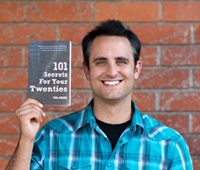Written by Paul Angone The great chasm between Boomers and Millennials can feel like crossing the Grand Canyon on a three-legged donkey.
Or so it feels.
And to try and reach the other side faster we bridge the Understanding-Gap with stereotypes. Instead of taking the time to travel there to see for ourselves, we listen to those who swear they've been there and know all their weaknesses.
And at the core there seems to be one question at the forefront of all debates and articles – What's wrong with twentysomethings these days?
Like The Most Interesting Man in the World -- Millennials seem to be a walking paradox that makes for great entertainment.
Yet, why is it that stereotyping most topics is completely taboo, yet stereotyping an entire generation is all the rage?
Entitled. Narcissistic. Lazy. The Facebook Generation all about instant gratification. Generation Me.
We need to stop throwing out the same tired buzzwords to define the "twentysomething problem".
We read a NY Times or Huffington Post article and think we have Millennials pegged.
As I wrote in my book 101 Secrets for your Twenties, "why do we think an entire generation can be summed up with a two paragraph label like a box of Wheat Thins?"
Because it's not entitlement or narcism or laziness that is expanding the chasm between Millennials and Boomers–it's the stereotypes.
The Danger of Generational Stereotypes
Many of us are not taking the time to truly understand Millennials because it's much easier to have the three word answer than to take the time and effort to ask the right questions.
Buzzwords can't be gospel truth.
Some twentysomethings will act entitled, some won't.
Some will have an IV of technology hooked to their veins, some will like the feel and smell of a good book.
Some will persevere and work their ass off, some will take repeated naps and watch Netflix.
Some will get married young, some will cast marriage off like a pair of worn tennis shoes.
Some are immersed in social media, and yet at the same time feel very alone.
Yes we can make generalizations to try and understand, but let's be careful not to treat generalizations as facts. Because the problem is that these stereotypes become a self-fulfilling prophecy.
Stereotypes become your reality.
If you think twentysomethings are entitled, then you're going to continually look at twentysomethings through that lens. Your perception will define your reality. You won't look for examples of self-sacrifice or hard work because that would be contrary to the truth you already know.
Because you've read a Huffington Post article on Millennials doesn't mean you understand them.
Because you have twentysomething children does not mean you know what all twentysomethings are going through.
There's 80 million Millennials today who are each complex, unique individuals.
Millennials, just like every generation, have grown up in a wide array of circumstances and backgrounds specific to this time in history. And they're going through a real struggle of transition, uncertainty, doubt, depression, and frustration as life has turned out nothing like they planned.
And just because you don't want to acknowledge that the struggle is legitimate doesn't mean it's not happening.
I've spent close to a decade researching emerging adulthood, writing about what is truly at the heart of the twentysomething struggle, and I will not be so brash or arrogant to say that I have them completely pegged.
So how do we move beyond stereotypes and actually bridge the Generational Understanding-Gap towards healthy, productive, edifying relationships between generations?
Open, Authentic, Conversations
Both Boomers and Millennials need to come to the table and have open, honest conversations.
Boomers would do us well to remember, and Millennials would do well to forget.
- Boomers need to remember what it was like to be in their twenties to help Millennials through their questions.
- Millennials need to forget about having all the answers, and be open and vulnerable to learning from those who have gone before.
Parents, bosses, pastors remember when you were anxious about the future and overwhelmed with doubt? Where you were barely getting by yourself and struggling to find your place?
Millennials weren't around when our parents were thick in the struggle.
Millennials didn't see our parent's sacrifice as much as we saw our parent's success.
Boomers the more real and honest you can be about the difficulties you faced growing up, the closer the Understanding-Gap will become. If bosses can go back and remember how they felt when they were nothing in the office, they can help empathize with twentysomethings and help them find productive ways to grow, instead of casting them aside as lazy or entitled.
The biggest obstacle facing most Millennials today in the office is not a lack of work ethic, but a lack of understanding.
Twentysomethings are desperate for mentors who are willing to tell the truth of their own struggle.
As 74-year-old author Parker Palmer wrote:
“When I was young, there were very few elders willing to talk about their darkness; most of them pretended that success was all they had ever known ... I thought I had developed a unique and terminal case of failure. I did not realize I had merely embarked on a journey toward joining the human race.” – Parker Palmer, Let Your Life Speak
Boomers. Millennials. There's similarities in our struggle. The more we can understand and identify with the other side, the less we'll rely on stereotypes to bridge the gap.
We'd love to hear from you the comments below:
Have you experienced stereotypes because of your age?
Do you have strategies for transcending stereotypes?
 About Paul
About Paul
Paul Angone is the author of 101 Secrets for your Twenties and the creator of AllGroanUp.com, a place for those asking "what now?" Snag free chapters from his book and follow him at @PaulAngone.
This post originally appeared at AllGroanUp.com.
